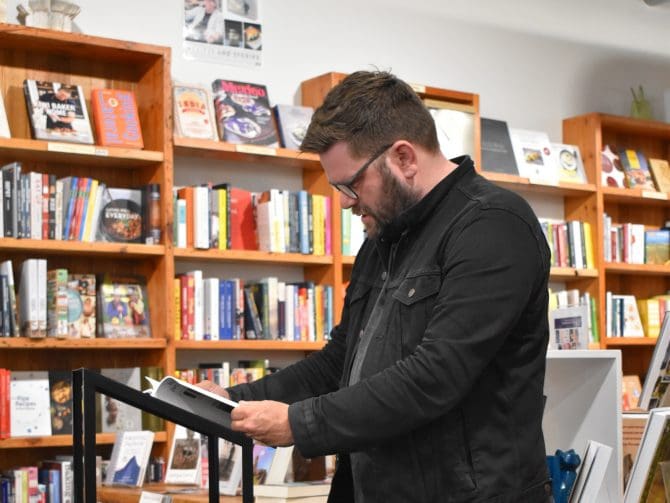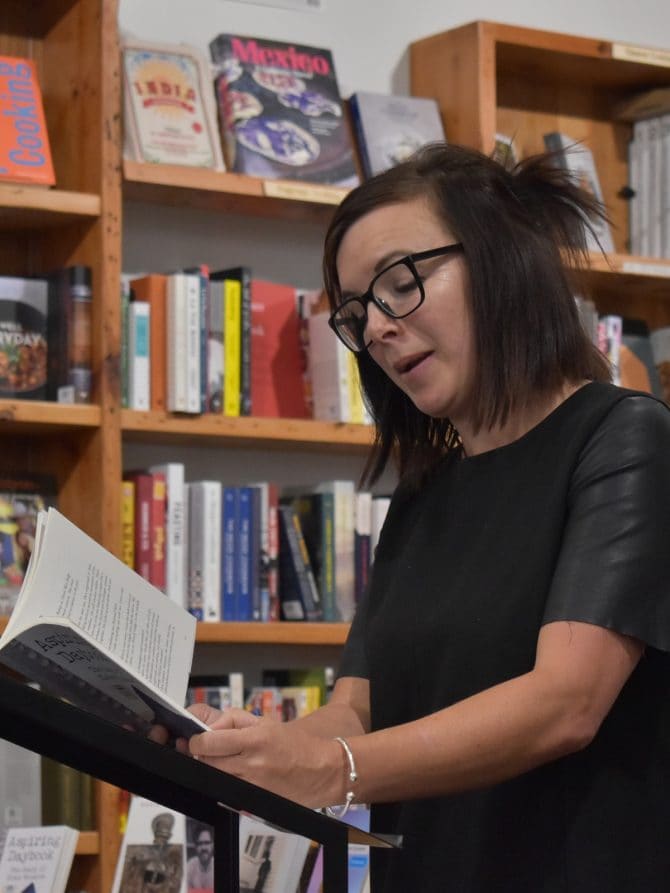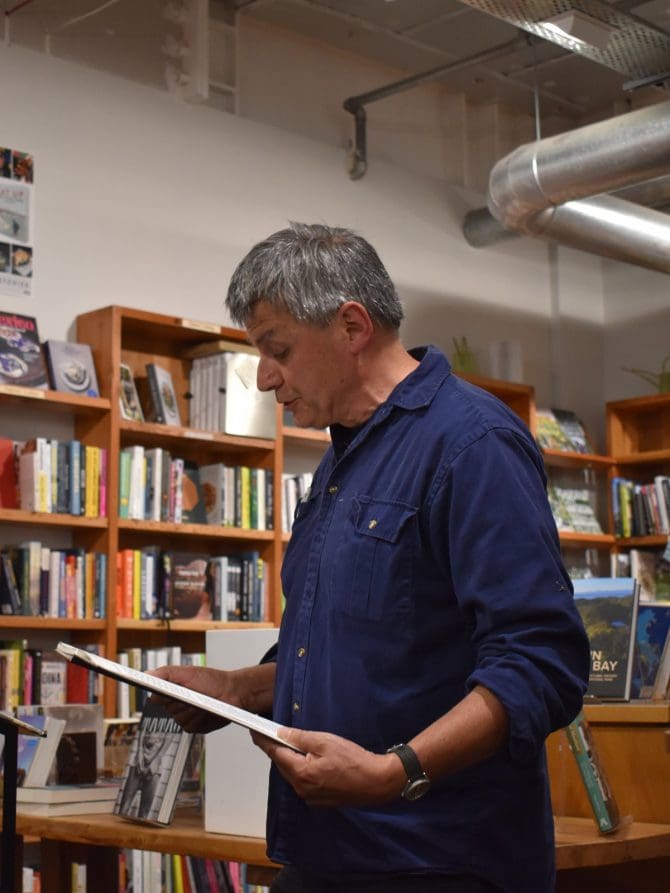As I take my seat in a full house at Scorpio Books a man is bouncing around taking photos. As he pops out from behind the stacks, taking a shot of the crowd, I consider asking him for a link as my phone is bung (which is, in fact, how there came to be photos in this post).
The excited buzz dies to an expectant hush as the photographer, none other than poet Erik Kennedy takes the floor to introduce Keen! - a gathering of Ockham Award-nominated Southern Poets.
Introducing himself from his own bio, Erik reads a few wowing words from There's No Place Like the Internet in Springtime; his debut collection, following on from his poetry chapbook, Twenty-Six Factions.
There's No Place Like the Internet in Springtime
I love this whimsical title, reflecting as it does the nature of Kennedy's work: insightfully ironic.
You Can't Teach Creative Writing is a good example of the opposites at work in Kennedy's themes. Beginning with feathers-up fighting talk, Erik then urges the reader/writer to "invent parents to write about/ if yours are real-estate agents." (which brings to mind Donna Tartt.)
Erik's poetry, says literay critic and poet Stephanie Burt,
layer(s) comedy over insight over rue and pathos over comedy.
Double Saw Final at the Canterbury A&P Show mixes the rough and the smooth, the "achingly unctuous motion" of "sawing the shit out of wood." The terrible beauty of this poses the question, "whether to be the man, or the tool?"
Wow.
An American Kiwi living in Christchurch, Kennedy is often asked if he misses the U.S. His response, in Remembering America, is to list the things he misses; things that probably don't even exist any more, like our forty-something memory of K-Bars and hooning around on bicycles on dirt roads.
"Missing something is a state of mind, says a Polar Bear on her shrinking ice floe.
Knowing not to miss it is a state of grace, says the hermit crab in her rented carapace".
Yet there is a warning in this reverie; beware the constructed ideal of a nation's past that media would have the world believe... powerful stuff.
In Get a Pet with a Longer Lifespan Than Humans Have Kennedy hiliariously extols the virtues of dying before your pet, such as saving psychic energy from never having to grieve...
Setting a challenge for the others, Erik signs out on Love Poem With Seagull. His mastery of spoken word soars to new heights (and without a microphone) as he describes the "post-saurian psycho seagull" stealing his fish and chips while he emits "mammalian, bat-like shrieks," while still being cherished, unbelievably, by his partner.
Auckland-based poet Michael Steven's Walking to Jutland Street refers to a shared flat from Steven's youth; near the wharves in Dunedin.
Steven is described as a 'gritty' poet;
seek(ing) the allegorical significance of the present moment. (Otago University Press).
As he takes the floor, Steven's quiet manner conceals deep thinking; his poetry is self explanatory, he says. I think there are some game changing ideas in this collection.
The Story of My Past Lives combines the conflicting miasma of human existence with humour.
Steven invokes well-known and much-changed landmarks of Christchurch past in Tic Douloureaux: Hereford Street outside the Apollo, while Walking To Jutland Street hearks back to student days living in dives around the wharves of Dunedin. All poets refer to drug cultures once tasted; in Jutland St the walk ends with poppy tea.
This collection is full of memories, music and mortality, which will enlighten if not remind us of where we have been, and where we could end up (Dropped Pin, Latimer Square).
These "thoughts from another life" end with an evocative ode to his father's car painting garage in Nelson Street with its roller door and buzzing community around it. Industrial and contemplative, whose reverie is it?
Britomart is Stevens' love poem. Awesome. Its a bus depot in the heart (or bottom) of seedy Queen Street in Auckland.
Michael introduces creative writing teacher (oops) Annabel Wilson, who has organised tonight's event. Annabel is the author of the wonderful mixed media Aspiring Daybook, the Diary of Elsie Winslow, nominated for for the New Zealand Mountain Book Festival award.
Mixed media is making its way into fiction. I've seen a number of stories written in verse lately. Annabel's first book combines a diary with lists, poems, images and letters to capture a year in the life of a woman nursing her terminally ill brother.
Like a hiker's journal, Aspiring Daybook uses the mountainous landscape around Lake Wanaka as the backdrop for Elsie's experience. The result isn't poignant or sentimental, it's breathtaking:
Sterile lake, the operating table in a blue hospital room. We stare, laugh at the way we seem on its gunmetal surface. (Meniscus)
White patches on your X-ray move upwards like a vertical avalanche. (Compromise)
Elsie's character was originally created for a play, No Science To Say Goodbye, in 2017.
"Elsie's story is a fractured, sedimentary and reflective thing, exploring the hidden darkness inside the beauty that is everywhere". (Submarine Press)
Read aloud, Supermarket demonstrates Annabel's rhythmic use of language, linking human life to the element of nature that overshadows her.
The slower pace of Winter Solstice creates a feeling of limbo, while Mata Au uses the opposing images of the rushing Clutha river, always renewing itself, against the stillness of the human wader.
In Sunny Slopes Are Prone to Slides, the allegory of avalanches threatens to overwhelm Elsie with emotion. Annabel says poets take the weather personally.
Annabel is originally from Wanaka and now lives in Christchurch. She has held an R.A.K. Mason Fellowship, the Australasian Association of Emerging Writers Emerging Writers' Prize, a residency at Robert Lord Writers' Cottage and an MA in Creative Writing from Massey University. She also runs On Magazine, an amazing site that combines New Zealand art, adventure and culture.
David Eggleton is well known in NZ poetry circles. His prolific work includes many formats, including CD, documentary and performance poetry. Best heard aloud, his new collection, Edgeland, attests to his signature rhythmic voice.
David read from this wonderful book full of colourful canon of kiwi life, rendered lyrically beautiful by its flawed humanity.
Distant Ophir referers to the beauty of John Masefield's nightingale,in comparison to the routine of kiwi life lost to the past;
a time gone like a sold farm.
5-Cent Coin is a rap, delighfully celebrating the wee coin we took out of circulation here about twenty-five (!) years ago. Refrain: "Drop. 5-cent coin."
Portrait in a surveillance camera monitor with its wonderful rhythm asks the question, history? or no history? in a place (Christchurch) where
memory (is) a concrete ghost town.
From this poignant moment we roll raucously into The People Smuggler's Beard; a commentary on current society's historic obsession with beards. Eggleton invokes an image of a naked Alan Ginsberg and cites
Ode to Magnetic South and River (the Wairau) bring to life the swimming holes, mountains, sponges and scones integral once to a Kiwi youth; the imagery of Eggleton's "Inner Aotearoa" at once vivid and poignant.
David rounded up this gift of an evening with The Age of the Anthrocene,
a modern diatribe on the state of Man:
an age of too long didn't read,
an age of laughed out loud till I puked...
this is an age of planet rich, planet poor,
of planet stupid, planet more...
an age of armageddonites who gather at the river,
only there's no river there...
this is an age to declutter and scatter ex-husbands...
...like a break-up party
where everyone has a good cry...
an age of draining the swamp and swamping the drainage...
an age when you want to tear the thumping
from your chest
an age when all buses should kneel on request.
Poetry is alive and kicking in the South, and these guys are proof that poetry is not just made for the printed page. The only detraction from this evening was that they can't all win the Ockham Award.
More information
- The Ockham New Zealand Book Awards
- Our page about Poetry







Add a comment to: Keen: Ockham poets read at Scorpio Books